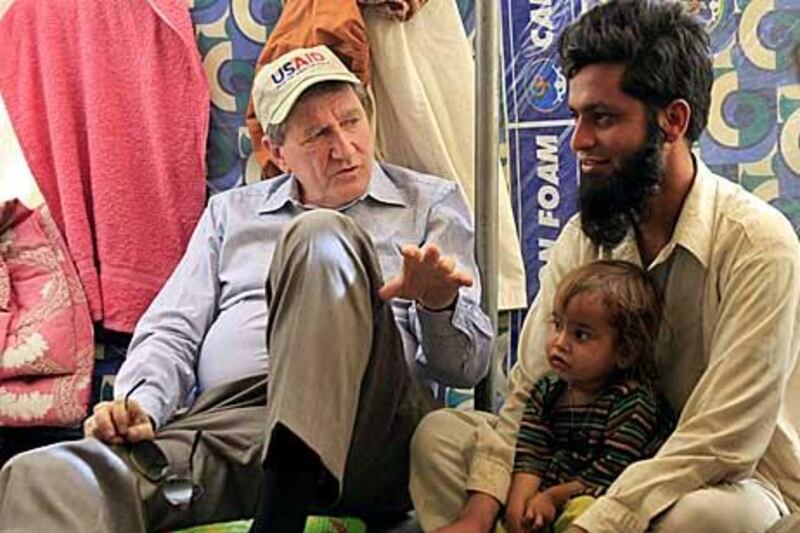Abrasive, erudite, melodramatic, eloquent, inimical, humorous, a master tactician: the quintessential US diplomat Richard Holbrooke, who has died at age 69, was many things to many people, but above all he was effective in getting what, or where, he wanted. His nickname, "the Bulldozer", said it all.
Involved in many of the key battlegrounds of the 20th century, he will be remembered most for his achievement in brokering an end to the war in Bosnia at the Dayton Peace Accords held in Ohio in 1995, which earned him a nomination for the Nobel Peace Prize.
He served every Democratic president since John Kennedy but never attained the position he coveted most: secretary of state. Still, the possible appointment of Holbrooke to a place in the administration became a hot topic of discussion whenever a Democrat was poised to take the White House.
Within days of taking office, Barack Obama named him as his special representative to Afghanistan and Pakistan. The language of his appointment mattered greatly to Holbrooke. He did not want to be a "special envoy" but, specifically, a "special representative".
The difference was that he would be not merely an emissary, but also would run operations on the civilian side of US policy. The phrase coined for his sphere of influence was "Af-Pak" - Holbrooke preferred "Pak-Af" - the juxtaposition of the two countries implying that one could not deal with them separately because their fates were inextricably interlinked. His role in the development of a new military and diplomatic strategy for the region was crucial.
As a private citizen, he had visited Afghanistan in 2006 and 2008 and had written a number of opinion pieces in The Washington Post in which he proposed changes in US policy. He also recommended more development aid for the new democratic government in Pakistan, especially in the tribal regions where jihadists thrived.
Barely 21 when he entered the foreign service in 1962, he arrived in South Vietnam the following year. As a civilian representative for the Agency for International Development working on the rural pacification programme, he was assigned to a post outside Saigon in a poor province in the Lower Mekong Delta called Ba Xuyen.
He lived alone above a shop, took showers from a cistern and went out to the US airbase almost every night of the week to watch whatever film was showing.
Of his time in Vietnam, he later said: "I was at the centre of the world where I wanted to be. I had wanted to see war … and I had wanted to participate in history, and I was doing both." His days were spent distributing cement, cooking oil and roofing thatch to villagers, building schools and helping train the militias of the local hamlets.
When the then-pesident Lyndon Johnson formed a team of Vietnam experts, Holbrooke was included, despite being only 24. In 1968, he joined the US delegation at the peace talks with the North Vietnamese in Paris.
The talks made no headway and, after the election of Richard Nixon that November, he moved to Princeton University, becoming a fellow at the Woodrow Wilson School. He was the author of one volume of the famous "Pentagon Papers", the secret history of the US government's involvement in Vietnam, which were subsequently leaked to and published by The New York Times.
In 1970, he became the Peace Corps director in Morocco. The following year he visited Peace Corps operations in Afghanistan and was captivated by the country, later recalling: "I saw this romantic, exotic, harmonious, multi-ethnic society, just a few years before it was destroyed."
Returning to the United States in 1972 he edited the influential Foreign Policy magazine for four years. The magazine, of which he was co-founder, published provocative articles on Vietnam and the Middle East that garnered considerable attention, some of it complimentary, some deeply critical.
When he returned to politics it was as a security adviser to Jimmy Carter who was then running for the presidency. Once Carter was elected, Holbrooke became assistant secretary of state for East Asian and Pacific affairs. He was the youngest person ever to hold the position and the job inspired in him a committed interest in the plight of refugees.
He remained in the post until 1981, overseeing the normalisation of relations with China and the relocation of thousands of Indochinese refugees to the United States.
After Ronald Reagan's election, Holbrooke left public service for a career on Wall Street. When Bill Clinton came to power, he returned again to the political arena. Named ambassador to Germany in 1993, he helped to shape US relations with the new state after its reunification and was a central figure in promoting Nato enlargement after the breakup of the Soviet Union.
While assistant secretary of state for European and Canadian affairs, between 1994 and 1996, Holbrooke visited Bosnia as a member of a peace-seeking delegation. His appointment as negotiator with the various leading characters in the conflict was indicative of how desperate the administration had become.
Holbrooke had no moral qualms about dealing with people who had committed, or sanctioned, despicable acts and embraced the Herculean task of reconciling the three competing nationalist factions, each of a different religious persuasion. Time magazine reported that, "the reason everyone quit fighting, it was joked, was that this was 'the only way to get Holbrooke to go home'."
Richard Charles Albert Holbrooke was born in New York in 1941. His father was a doctor, a Russian Jewish émigré, and his mother was from a German Jewish background. Educated at Scarsdale High School, in 1962 he went to Brown University, and in 1970 to Princeton, where he completed a postgraduate fellowship.
He was married three times and is survived by his wife, Kati Marton, and his two sons from his first marriage.
Born April 24, 1941. Died December 13, 2010






